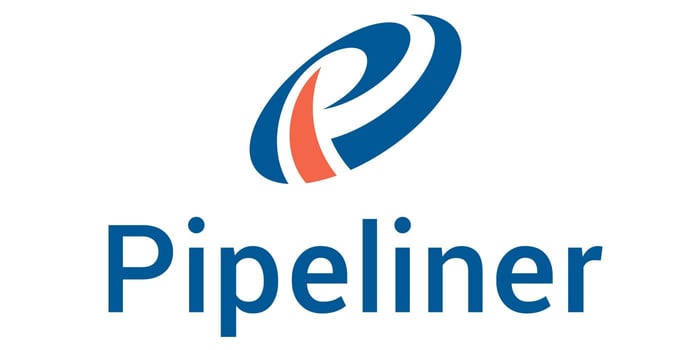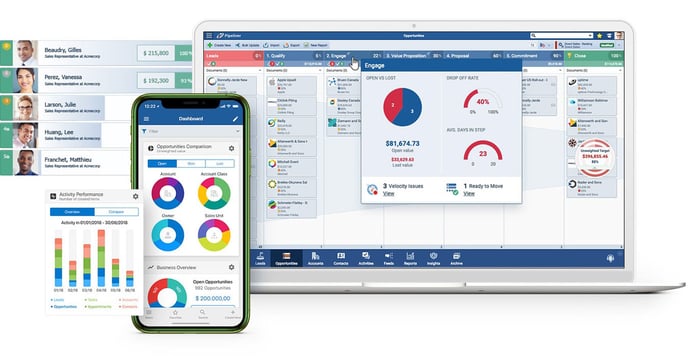
TL; DR: Pipeliner’s customer relationship management (CRM) software was created for salespeople by salespeople to provide a user-friendly alternative to the traditional sales pipeline. The company is on a relentless mission to equip reps with self-management tools that provide data enrichment and workflow automation, all while guaranteeing robust security via iron-clad hosting from Amazon Web Services (AWS). Pipeliner also features a comprehensive relationship mapping solution designed to help salespeople build meaningful and lucrative connections with clients and prospects.
The best sales reps seem to be the ones with a bit of fire in their blood — they’re tenacious, assertive, and have a knack for leaping over hurdles. They’re also highly people-focused and happiest when engaging customers directly.
Considering these strengths, it’s no surprise that the average salesperson doesn’t want to spend hours a day manually entering data into a clunky customer relationship management (CRM) platform. These systems are supposed to help close sales — not get in the way of them.

Pipeliner reinvents the CRM of the past with insightful visuals and sales-enabling tools.
“Salespeople have a reputation for hating CRMs, and for good reason,” said John Golden, Chief Strategy & Marketing Officer at Pipeliner. “Traditionally, they’re management tools that are imposed on salespeople but don’t enhance the sales process in an effective way.”
Pipeliner, on the other hand, provides a highly visual, user-friendly alternative that helps reps streamline their workflows while giving managers the information their teams need to succeed. The platform’s uniform navigation, dynamic reporting, logical organization patterns, focus on visualization, and customizable features help increase adoption rates among reps, boosting ROI.
“People generally consume visual information much faster than they do text or otherwise, so we focused on making Pipeliner as visual and uniform as possible,” John told us.
Self-management features, such as data enrichment and workflow automation, save time, while notoriously secure hosting from Amazon Web Services (AWS) provides peace of mind. Pipeliner tops these offerings with relationship mapping tools designed to help reps do what they do best: build meaningful customer connections.
Taking a Forward-Thinking Approach to CRM Usability Since 2011
Nikolaus Kimla, CEO and Founder, was struck by the inspiration to launch Pipeliner nearly 10
years ago while operating as a serial entrepreneur.
“The initial driving force was the fact that he had never found a CRM that worked for him — particularly from the perspective of a salesperson,” John said. “That was our first real differentiation in the market. We created the first CRM that was extremely usable for both salespeople and sales managers. And that increased adoption rates.”
John told us he has years of experience in the performance improvement space, where he used multiple CRM systems. When he learned about Pipeliner, he instantly understood why reps love the solution — and that inspired him to join the team.
“I finally found a CRM that was visual; one that was usable,” he said.
The Pipeliner team’s philosophy is centered on cybernetics, a practice used to gain control over the complexity of a system. The company named Version 9.0 of its software Automata after a written work by the Hero of Alexandria, a Greek engineer and mathematician who specialized in cybernetics research.
But the concept goes beyond naming conventions. “We follow cybernetic principles, which is the science of simplification — in our case, in sales and businesses,” John said. “We apply these principles within our product development. We are relentless in our focus on usability and effectiveness.”
Empowering the Frontline Salesperson with Self-Management Tools
While giants in the CRM space may puff up their feathers over market share, Pipeliner remains competitive by genuinely understanding the customer.
“First and foremost, Pipeliner was built by salespeople for salespeople,” John said. “There are obviously major players in this space, like Salesforce and Microsoft Dynamics, but they tend to be stuck in the past in terms of the way they approach their CRMs. We always continue to improve, even if it’s the slightest little tweak to enhance usability.”
Over the years, the CRM market has also grown more broad as technologies make it easier for developers to churn out platforms.

The CRM provides at-a-glance information on organizational structures, sales opportunities, and performance.
“Unfortunately, we’ve seen a lot of people come into the market with point solutions that look good on the surface but don’t have a lot of depth,” John said. “Unlike hastily developed solutions that are kind of superficial, we have a very visual, easy to use system with a huge amount of power behind it.”
Understanding the reality of the day-to-day sales process also allows Pipeliner to differentiate itself from the pack with a range of self-management tools. The Pipeliner team often refers to its customers as “salespreneurs” because commission-based payments force them to creatively manage what are essentially microbusinesses.
“We understand frontline salespeople, so one of the key elements of Pipeliner is that the same tools that are available to a manager are available to the individual user,” John said. “Obviously, each employee won’t necessarily have the permissions to see all of a company’s data, but they can run reports, set up profiles, and manage their own data.”
When it comes to data, of course, Pipeliner works with the Privacy Shield-certified Amazon Web Services as a subprocessor for hosting services in the U.S.
Featuring Data Enrichment and Workflow Automation
When hunting for the ideal CRM, it’s easy to overlook the total cost of ownership. John told us buyers should be wary of choosing the product with the lowest licensing price.
“A lot of times, people forget to consider the business interruption, the fact that they may have to hire a full-time administrator, and that there may be hidden fees with other companies,” he said. “Especially in a time like now, when people have to be careful where they put their dollars, considering overall return on investment is crucial.”
With Pipeliner, there’s no need to hire an experienced administrator — the system is so easy to use that non-technical employees can get started quickly. This makes onboarding and adoption far less stressful.
The platform also helps employees save time with a built-in automation engine designed to eliminate the manual work that can slow down a sales cycle. The superhero-like tool, known as the Automatizer, helps users scale and optimize tiresome sales processes.
The system enhances workflows through if/then conditions and multiple actions — and it doesn’t require a lick of code.
“The Automatizer is an extremely powerful workflow process engine designed to improve efficiency, focus, and output,” John said. “You can set it up to trigger messages to salespeople when a lead comes in, or help with things like data enrichment — which will identify, for example, if a phone number is missing.”
To further enhance efficiencies, the company also recently added a feature known as the BI Feeder. The technology allows users to export Pipeliner data to PostgreSQL database accessible through the business intelligence solution, allowing them to connect sales data across departments and other siloes.
Next-Level Connections via Relationship Mapping
As for what’s new, John told us the Pipeliner team has been working hard on a built-in relationship mapping feature that empowers users to build smart organizational hierarchy charts for each client account.
The feature ensures a quick and easy process for assigning and arranging contacts associated with an account according to position and rank. Users can aggregate data from multiple accounts and even assign buyer roles to specific sales opportunities.
“You can build out a beautiful map to define the landscape of the projects you’re working on,” John said. “It’s easy to identify the decision-makers, the influencers, the budget holders, and even the overall corporate structure with a visual.”
HostingAdvice.com is a free online resource that offers valuable content and comparison services to users. To keep this resource 100% free, we receive compensation from many of the offers listed on the site. Along with key review factors, this compensation may impact how and where products appear across the site (including, for example, the order in which they appear). HostingAdvice.com does not include the entire universe of available offers. Editorial opinions expressed on the site are strictly our own and are not provided, endorsed, or approved by advertisers.
Our site is committed to publishing independent, accurate content guided by strict editorial guidelines. Before articles and reviews are published on our site, they undergo a thorough review process performed by a team of independent editors and subject-matter experts to ensure the content’s accuracy, timeliness, and impartiality. Our editorial team is separate and independent of our site’s advertisers, and the opinions they express on our site are their own. To read more about our team members and their editorial backgrounds, please visit our site’s About page.

